




 |
   |
 |
|
P Paatos Jimmy Page Jimmy Page & Robert Plant |
Palace Chuck Palahniuk Nerina Pallot Palm Pizazz! |
Bruce Palmer Paloalto Tullio Palumbo Pancake |
Pangaea Liz Pappademas Didier Paquette Jill Paquette |
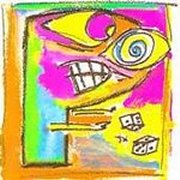 |
P (1995, 57.16) ***½/TT | |
| I Save Cigarette Butts Zing Splash Michael Stipe Oklahoma Dancing Queen Jon Glenn (Mega Mix) Mr. Officer White Man Sings the Blues |
Die Anne Scrapings From Ring The Deal |
|
Current availability:
Mellotron used:
The irritatingly-named P (you try Googling it) were a one-off 'supergroup' (ugh) of the inimitable Butthole Surfers' inimitable Gibby Haynes on his patented effected vocals and Johnny Depp (yes, that one) on guitar and bass, plus two of their friends and several guest players. P is pretty much what you'd expect, largely raucous rock'n'roll with bonkers vocals and huge lashings of irreverence (irrelevance?) all round. Haynes is on top form, but you wouldn't have a clue Depp were involved if the booklet didn't tell you, with fairly faceless guitar work throughout. A handful of tracks border unlistenable: Jon Glenn (Mega Mix) is a lengthy (and tedious) dub experiment and White Man Sings The Blues is funny for about a minute, while lasting an interminable six-plus, but even the eight-minute weird-fest Scrapings From Ring is worth hearing and several tracks are genuinely good.
Andrew Weiss plays bass and Mellotron, with a lovely string part on Michael Stipe, which brings me to the Butthole Surfers' Stipe story. They were apparently obsessed with the REM frontman, presumably before his band's dropping of all musical standards and attendant rise to fame'n'fortune (or maybe not?). The Surfers' old tour van finally died, so they towed it to Stipe's house and left it outside, allegedly painting on the windscreen something along the lines of (quotes vary):
| "Michael Stipe, despite the hype, We'd like to suck on your long tall pipe" |
Which may or may not've pleased Mr. Stipe. Who knows? More Mellotron strings on their twisted cover of Abba's Dancing Queen, by no means the strangest instrumentation used on the song... Two more minor Mellotron tracks, with the occasional single string note on Scrapings From Ring and distant choir and flutes on The Deal, but they make little difference to the album's overall rating.
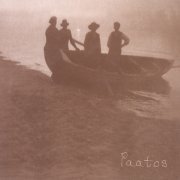 |
7" (2001, 10.18) ****/TTT½ Perception Tea |
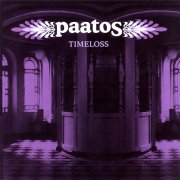 |
Timeloss (2002, 39.47) ****/TTTTSensorHypnotique Téa They Are Beautiful Quits |
 |
Kallocain (2004, 51.36) ****/TTTGasolineHolding on Happiness Absinth Minded Look at Us Reality Stream Won't Be Coming Back In Time |
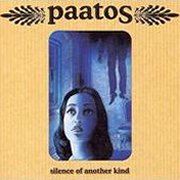 |
Silence of Another Kind (2006, 42.08) ****/TT½ShameYour Misery Falling Still Standing Is That All? Procession of Fools There Will Be No Miracles Not a Sound Silence of Another Kind |
Current availability:
Mellotrons used:
Paatos were formed by two ex-members of Swedish prog revivalists Landberk, one of whom (guitarist Reine Fiske) has since left for the wonderful Dungen, leaving only Stefan Dimle, also owner of renowned Stockholm shop/label Mellotronen. The band pick up where Landberk left off, playing gentle, melancholy progressive rock on largely vintage gear, this time with female vocals (Petronella Nettermalm), suiting the music perfectly. They set out their stall with 2001's vinyl-only single, Perception, backed with the misspelt Tea (Téa, corrected on the album version), in honour of Petronella and drumming husband Huxflux's baby daughter. Both tracks feature a long, slow build-up, Mellotron strings from Johan Wallén breaking in at the nearest each track gets to a crescendo. This isn't going to be easy to get hold of, unless you a) see them live or b) visit Stockholm (just done both), but it's worth the effort if you can find a copy.
The sensibly-lengthed Timeloss carries on in the same excellent vein, four medium-length tracks of quiet beauty, although they're not immune to picking up the pace every now and again, not to mention the odd Mellotron-fuelled crescendo. The album's 'oddity' is lengthy closer Quits, with a drum'n'bass-inspired rhythm, working surprisingly well. It's the only non-Mellotron track, Wallén on (unspecified) electric piano. I can confirm that the band own their own M400, painted a fetching baby blue, sans feet, with very odd little spoked wheels replacing the knobs. They seem to have strings/flutes/oboes tapes; the oboes are used here and there, making a welcome change from the usual sounds. One minor gripe, though, is the intro to Téa, copped straight from Änglagård's Sista Somrar from Epilog, although I didn't notice the rip on the single version. What were they thinking of? These bands all know each other...
Two years on, Kallocain starts in uncharacteristically upbeat mode with the Eastern-flavoured Gasoline, soon shifting down a couple of gears to by-now familiar Paatos territory. There are no actual standout tracks here, but nor are there any surprises like Quits, the rest of the album being the same type of laid-back but curiously intense progressive as the bulk of Timeloss. An interesting feature of the album is Wallén's Mellotron use (all strings, by the sound of it); it's on seven of the nine tracks, but, by and large, used with great restraint, making the occasional heavier use stand out all the more (the 'Tony Banks' trick).
While Silence of Another Kind produces no major surprises, it's another very good album, if sitting pretty in familiar territory. It opens with the uncharacteristically heavy Shame, sounding not unlike Anekdoten, soon settling into their regular groove. Procession Of Fools is a very short instrumental piece, while the closing title track consists chiefly of various effects, leaving Not A Sound as the album's probable highlight, as well as longest track. Wallén's Mellotron is use mostly as restrained as on Kallocain, although Not A Sound sees him let rip on the strings in fine style, but again, low-ish on the Mellotron front.
See: Samples etc. | Landberk | Dungen
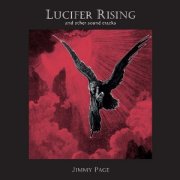 |
Lucifer Rising & Other Sound Tracks (2012, recorded 1973, 32.01) ***½/TT½Lucifer Rising - Main TrackIncubus Damask Unharmonics Damask - Ambient Lucifer Rising - Percussive Return |
Current availability:
Mellotron used:
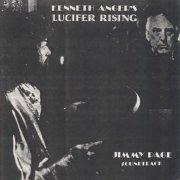 |
Jimmy Page's legendary aborted soundtrack for Kenneth Anger's Lucifer Rising is, I believe, the only known solo Zeppelin recording during the band's lifetime. Page was approached by Anger at an auction of Aleister Crowley memorabilia in 1973, agreeing to write and record a soundtrack for his new film project, which ended up dragging on for three years or so, probably due to Page's considerable Zeppelin commitments. Stories differ, but Anger claims he was locked out of Page's London house, where he had been editing the footage into shape (for free, it should be noted), immediately retaliating by sacking Page from the project and hiring Bobby Beausoleil (ex-Love), who had already acted in the film, to record a new soundtrack, even though he was serving a prison sentence for murder, having got himself mixed up with Charles Manson. With me so far?
Page had only produced twenty-something minutes of music in three years, which was partly why Anger lost the plot, it seems; the 'drone' section that opens 1979's In Through the Out Door's In The Evening is rumoured to be excerpted from it, but it's hard to tell, frankly. Twenty-odd minutes have circulated for years on bootlegs, but we've had to wait until 2012 for Page to finally decide to release this legendary piece officially (thanks for this, Alex) and then only on vinyl, paired with some other, shorter works, titled Lucifer Rising & Other Sound Tracks. Most of the title piece consists of vast, unearthly, bowed drones, various instruments layered over the top, notably acoustic 12-string, ARP synth (probably a 2600) and Mellotron, the end result being every bit as unnerving and occultish as you could want, while the shorter tracks on side two are either simpler takes on the style or overdubbed excerpts from the main piece itself.
Page has been quoted as saying that, amongst other, more exotic instruments in his home studio, he owned 'synthesizers and a Mellotron'; presumably a different machine to Zep's touring M400. Pitchbent flutes can be heard around the four-minute mark, choppy strings and cellos drifting in about three minutes later, dropping out after a few minutes. Is this worth hearing? For Zep fans: yes. For film buffs: yes. For Mellotron obsessives: possibly. At least we can finally hear what all the fuss has been about for so long in the Zep fan community. Now all we need to find is the legendary acoustic guitar concerto Swan Song, although my guess is that it was never recorded, or probably even finished.
See: Led Zeppelin
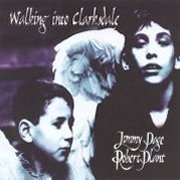 |
Walking Into Clarksdale (1998, 60.52) ****/T |
|
| Shining in the Light When the World Was Young Upon a Golden Horse Blue Train Please Read the Letter Most High Heart in Your Hand Walking Into Clarksdale |
Burning Up When I Was a Child House of Love Sons of Freedom |
|
Current availability:
Mellotron used:
In 1994, Jimmy Page and Robert Plant did what everyone had wanted for the previous fourteen years, i.e. work together again. The resulting live 'unplugged' effort, Unledded (****) (ho ho), gave an interesting new perspective on many Zeppelin songs, but the four new pieces of music were, at best, pretty average (Wah Wah, anyone?), causing concern among fans over the quality of any further new material. '95's world tour was spectacularly good, but consisted entirely of Zep stuff, so it was quite a surprise when the duo suddenly came up with Walking Into Clarksdale in '98 (the title referring to the supposed 'home of the blues' in the Mississippi Delta). The album achieved the almost impossible, updating the Zeppelin formula without sacrificing integrity. Plant's vocal quirks and Page's guitar stylings are evident all over; while I wouldn't rate most of the material as highly as most Zep stuff, the quality remains high, notably on When The World Was Young, Most High and When I Was A Child.
Page is known as a Mellotron owner, notably the MkV prototype John Paul Jones played on stage in the mid-'70s (a weird, unfinished-looking device) and he apparently bought a standard M400 in the mid-'90s. There's (uncredited) Mellotron on one track only here, the opener Shining In The Light, with a nice complementary string part, possibly played by Tim Whelan, who's credited with 'oriental keyboard'. Anyway, a good album, particularly if you're into their '70s oeuvre. Note: at the time of writing (late 2002), rumours abound of a 'full' Zep tour in 2003, with JPJ and Jason Bonham, but I wouldn't hold out too much hope of any live Mellotron, given Jones' views on the subject. Another note: Well, that didn't happen, did it? The 'Ahmet Ertegun' one-off in 2007 was their last group activity.
See: Led Zeppelin
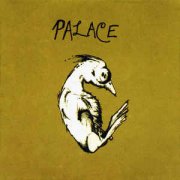 |
CDS/7" (1993) ***½/T½ Come in Trudy Dies |
Current availability:
Mellotron used:
Will Oldham used variations on 'Palace' as project names for several years during the '90s, before reinventing himself as Bonnie "Prince" Billy at the end of the decade. 1993's mournful Come In b/w Trudy Dies was his second (?) single and first as Palace, its predecessor appearing under the Palace Brothers moniker. This can be seen as a precursor to the wave of dirgelike Americana that began appearing later in the decade, although Oldham, never one to rest on his laurels, had already moved on.
Plush's Liam Hayes plays Mellotron cellos on the 'A'; not only does he appear to use a real machine on several other recordings, but the limited sample sets available in the early '90s didn't include the cello, so I think we can assume it's genuine. Both sides of the single are easily available on 1997's Lost Blues & Other Stories and, of course, YouTube.
Official Bonnie "Prince" Billy site
 |
Expedition (2015, 51.20) ***½/0Expedition (part 1)Expedition (part 2) |
Current availability:
Mellotron used:
Chuck Palahniuk is, of course, author of the seminal Fight Club, although most of us (yeah, me too) probably know it from the film. 2015's Expedition is a fifty-minute reading of its short-form prequel (published in the same year's Make Something Up short story collection) by the author, a powerful tale of abandonment and toxic masculinity; not a million miles away from the original novel, then. Palahniuk invests his own work with suitable gravitas, its twisted, fantastical plot slowly unravelling before the listener's ears, along with the protagonist's sanity.
Rob Campanella (The Quarter After, others) is credited with MiniMoog and Mellotron, although where the latter might be (the Moog is audible in places) can only be a matter for guesswork, as, other than the Moog, the only audible keyboard is the ever-present 'instrumentation' from Tyson Cornell. Unless someone can point out where it might be, then, this gets a rare '0' on the Mellotron front.
Pallas (UK) see: |
 |
 |
 |
Fires (2005/06, 46.51) **/T |
|
| Everybody's Gone to War Halfway Home Damascus Idaho Learning to Breathe Mr King Geek Love Sophia |
All Good People Heart Attack Nickindia |
||
 |
Year of the Wolf (2011, 39.57) **½/T |
|
| Put Your Hands Up Turn Me on Again All Bets Are Off If I Lost You Now Butterfly This Will Be Our Year I Think Will You Still Love Me |
I Do Not Want What I Do Not Have Grace History Boys |
|
Current availability:
Chamberlin/Mellotron used:
After being dicked around by the industry, resulting in a withdrawn album, Nerina Pallot released 2005's Fires on her own label, unsurprisingly, although a slightly remixed version gained a reissue the following year on 14th Floor (thus the two sleeve designs above). Basically, it's straightforward pop/rock with a dancey edge, so not something you're probably going to get too het up about, frankly. It probably does what it does well enough (interesting production tricks include reverse tubular bells on Mr King), but is that bloody Autotune I hear on a few high notes? Patrick Warren plays Chamberlin, with nicely overt flutes and strings on Geek Love, although the strings on Idaho are real.
2011's Year of the Wolf is better all round, the dance influence having seemingly withered into a far more palatable singer-songwriter pop/rock style. Highlight? Has to be the lovely Celtic harp section at the end of All Bets Are Off. Bernard Butler plays what sounds like real Mellotron on two tracks, with upfront, stabbed flute chords on Butterfly (plus real strings) and volume-pedalled strings on I Do Not Want What I Do Not Have.
 |
Palm Pizazz! (1978, 18.15) **½/TWar InsideMomma Stay Awhile Deliver Me As Long as I've Got You Silent Letter Turning Off the Road |
Current availability:
Mellotron used:
Palm Pizazz! were a little-known outfit from Cincinnati (well, have YOU heard of them?), who released a self-titled EP in 1978. It's a pretty mainstream effort, frankly, typical soft rock of the era, at its least dull on As Long As I've Got You and the brooding Silent Letter. Their lack of ambition is evident in the legend printed at the bottom of the rear sleeve: "Play this record at louder than normal volume for best results". 'Louder than normal'? Is that the best you can manage, guys?
George Haggis (no, really) played keys, including the Mellotron strings throughout Silent Letter. If you're at all bothered, you'll find Palm Pizazz! on YouTube, but I'm not exactly recommending it... The band morphed into '80s outfit Modulators, releasing three widely-spaced albums before disappearing in the early '90s.
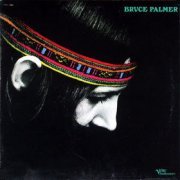 |
The Cycle is Complete (1971, 35.41) **½/TTAlpha Omega ApocalypseInterlude Oxo Calm Before the Storm |
Current availability:
Chamberlin(s) used:
Bruce Palmer is best known as bassist for Buffalo Springfield, although he played with his old compadre Neil Young in the early '80s, too. The Cycle is Complete is his only solo album and, while the influence of Hendrix's 1983 (A Merman I Should Turn To Be) is fairly evident on side-long opener Alpha Omega Apocalypse, I'm not at all certain that its spirit is anywhere to be found, probably due to Palmer (and possibly everyone else concerned's) heroic drug intake. The country fiddle is an interesting addition to the already well-worn 'tripped-out jam' format, but, although this actually sounds strangely contemporary in a way, it's still an acid jam that's probably designed (if that isn't too strong a word) to be listened to in the same spirit in which it was made. The rest of the album's pretty similar, albeit shorter, with more tablas and the occasional vocal. Overall, though, it's pretty stoned stuff and not that good at it, either.
Edward Roth or Jeff Kaplan (or both?) plays what's likely to be a Chamberlin on closer Calm Before The Storm. A major string part runs right through the ten-minute track, overlaid with that distinctive Chamby solo male voice, proving Chamby use, I'd say. In fact, the only instrumentation on the track is acoustic guitar, Palmer's lead bass, tablas and two Chamberlins, making it a surprise minor Chamby classic, especially considering the general tedium induced by the rest of the album. As a sad postscript, Palmer's lifestyle caught up with him eventually and he died of a heart attack in 2004, aged fifty-eight.
 |
Paloalto (2000, 53.15) **/T | |
| Depression Age Sonny Monolith Throw the Brick Home Some Things Must Go This Way The Mayor and the Seizure Pills Coming Back From the Sun |
Too Many Questions Swim Beauty of Disaster Made of Stone |
|
Current availability:
Chamberlin used:
Paloalto seem to be yet another in a long line of production-line US indie outfits, a bit grunge, a bit fifth-rate folk-rock, a bit, well, a bit what? This is apparently the reality of 'alternative rock', which, I have to say, is the equivalent of much 'alternative comedy', i.e. an alternative to it rather than of it. Even when the overlong Paloalto rocks, it doesn't really, as if the musicians concerned had never actually heard any actual rock music, but had made an album based on a description of it, which they hadn't fully understood. I can't tell you what its 'best tracks' are, as there aren't any; they're all a horrible whiny mess and I can only urge you not to bother picking this up under any circumstances whatsoever.
The wholly ubiquitous Patrick Warren plays Chamberlin on the record, with flutes and strings on Home; while it could be hiding in the mix elsewhere, in true Chamby style, it's just as likely to be sustained guitar. Thankfully, the band appear to have called it a day, although they managed to spit out one more slice of tedium before they imploded, 2003's Heroes and Villains, which you can be absolutely sure sounds nothing like The Beach Boys.
 |
Per la Mia Libertà (1977, 32.40) ***/T |
|
| Lasciala Andare Parlare Insieme Terra Messicana Pagliaccio Momenti... Indra Senti Bella Amore Infinito |
Guerriero Kumba Mela |
|
Current availability:
Mellotron used:
Tullio Palumbo is/was an Italian singer/multi-instrumentalist of no little obscurity, seemingly only ever releasing the one album, 1977's Per la Mia Libertà. It's a mix of Jaunty pop (opener Lasciala Andare), slushy balladry (Pagliaccio, Senti Bella) and Santana-esque instrumentals (Parlare Insieme and the disco-ish Indra, amongst others). Highlights? Well, everything's relative, but Parlare Insieme, guitar instrumental Momenti... and Guerriero stand out.
Amongst other keys (principally piano and organ), Palumbo plays a smattering of Mellotron, with a brief flute part at the end of Pagliaccio and a murky male voice line on Guerriero, although all strings (notably on Lasciala Andare) are string synth. To my surprise, I've found myself giving this three stars, as, despite its failings, it's a cut above your typical mainstream Italian album of the era. Do you need to hear this? No. Would you like to anyway? It's on YouTube.
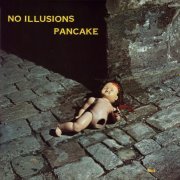 |
No Illusions (1979, 36.15) ***/TTTMust Miss Your SmileFire and Rain Songs Dream Deltaland No Touch of Illusions Autumn Leaves I Try |
Current availability:
Mellotron used:
Going by their third and last album, 1979's No Illusions, Pancake were more of a hard rock outfit than the more expected prog, although their female vocalist softened their edges slightly. Saying that, Dream Deltaland and Autumn Leaves are pretty damn' prog, although they never really escape their hard rock background.
Much of the album's keyboard work is rather average, but they get some Mellotron onto five out of six tracks, although it doesn't always sit comfortably with their style. Dream Deltaland has background strings from Uli Frank earlier in the song, before some seriously grandiose choirs towards the end, rivalling just about anyone's use, really, although they never quite hit those heights again. Otherwise, there are Mellotron strings on Fire And Rain Songs and No Touch Of Illusions, then more choir on Autumn Leaves and I Try, but, despite fairly heavy use, the album isn't really any sort of 'classic'.
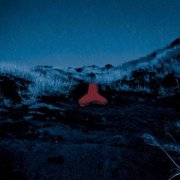 |
Unu (2004, 61.32) ***½/TT½ |
|
| Muddy Stream Mirror Dead Autumn Possession Shining Vectors Fixed Star |
Toji Rareta Hon The Closed Book Philosophy Burns (in the Universe) Kuramubon (Out!!) Mr. Dead Night Life.Full on |
|
Current availability:
Mellotron used:
It's often hard to tell with Japanese artists, but Pangaea's 2004 release, Unu, appears to be a one-off. Is this progressive rock? Mainstream pop/rock? Folk rock? All of the above? Produced by Rei Atsumi (Vow Wow, others), it features King Crimson's Ian McDonald on flute on several tracks, albeit not always the proggiest ones. Highlights are (big surprise) the proggier material, principally opener Muddy Stream, the thirteen-minute Fixed Star and the 'side-long', five-part Toji Rareta Hon, which moves through a plethora of moods over its near-twenty-five minute length.
Atsumi plays (presumably) his own Mellotron, proceedings opening with a lush strings/cellos part on Muddy Stream, with 'stabbed' flutes on Possession, background strings on Shining Vectors and strings and choirs on part four of Toji Rareta Hon, Mr. Dead Night, while the strings on the epic Fixed Star bear more than a hint of Crimson's Epitaph in their sweeping, minor-key grandeur. Frankly, I don't know what to make of this: it's half a great album, half 'yeah, whatever', exacerbated by its hour-long running time. Remove guff such as Mirror or Possession and you'd have a shorter, better album. Sort-of recommended.
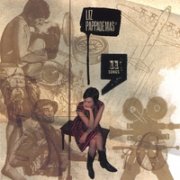 |
11 Songs (2007, 46.19) ***/½ |
|
| Loma Prieta Desaturate it I Had to Tell You Vacation Romance Go on, Kill Me Open I am Not That Rabid Dog The Born Again April Fool |
Keep Going West Soldier's Girls Hall Filled Up Like a Lake |
|
Current availability:
Mellotron/Chamberlin used:
In an online interview, Liz Pappademas recounts how a lecturer at Berklee said, "Stop writing dirges!". She admits he had a point, which doesn't stop 2007's 11 Songs being wall-to-wall dirge, or, as I prefer, sparse, haunted, piano-based songs of sorrow and other, non-upbeat stuff, possibly at their best on Desaturate It and Open.
Brian Kehew plays his own M400 and Chamby, with faint (Mellotron?) strings on Vacation Romance and lush, albeit background (Chamberlin?) ones on I Am Not That Rabid Dog. This is an album that has the potential to grow on the listener, unlike many, although I've no idea when I might find the time. Worth hearing.
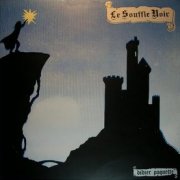 |
Le Souffle Noir (1981, 43.41) ***½/TLes Chevaliers de RolonLa Cité des Golodhrims Tres Précieux Tresor de Gollum Arwen Normaire Le Spectre des Minas Morgul Le Dernier Chant des Elfes Les Havres Gris |
Current availability:
Mellotron used:
Didier Paquette's Le Souffle Noir (The Black Breath) is a lesser-known entrant in the 'music inspired by Lord Of The Rings' category, the title referring, of course, to one of the Nazgûls' (Ringwraiths) secret weapons. Not that I know the book intimately or anything, you understand... Musically, the album veers between mostly instrumental progressive rock (Arwen Normaire's treated vocals being the sole exception) with a slightly Germanic feel and an even more Teutonic electronic style (notably on the brief Tres Précieux Tresor De Gollum). I have to say that none of it exactly inspires images of Tolkien's great work; Bo Hansson's Lord of the Rings does a far better job of that. Saying that, we all see and hear different things in literary works, so who's to say that this album has no connection with the book?
Paquette's Mellotron work is actually quite limited, a large proportion of the album's keys coming from still relatively-new (thankfully pre-digital) polysynths and more traditional monosynths. The most obvious Mellotron comes within the album's first minute, with a short string part on Les Chevaliers De Rolon, Le Dernier Chant Des Elfes having no more than some distant, heavily-treated choirs. Both Arwen Normaire and Le Spectre Des Minas Morgul have something similar, but with note-lengths way over the eight-second mark, while I have no idea what it is, it's most unlikely to be a Mellotron.
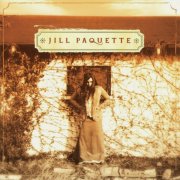 |
Jill Paquette (2003, 42.56) **/½ |
|
| Come to Me Not the Only One One Of These Days Lift My Eyes There To Here Broken Forget Sometimes Yes, Sometimes No |
Katie-Lynn So Close Free (Take My Life) |
|
Current availability:
Chamberlin used:
Jill Paquette-DeZwaan is a Canadian Christian artist, although, to be fair (I try, I try), her eponymous debut, while fairly horrible, isn't actually a full-on God-fest. Horrible how? Light-as-air folk/pop, infuriatingly upbeat, easily at its best on short acoustic guitar instrumental There To Here, although the more energetic Forget is, at least, listenable.
Tape-replay-player-to-the-Christian-community Phil Madeira adds a brief burst of Chamberlin flutes to Not The Only One. Can I recommend this on any grounds whatsoever? I can not.